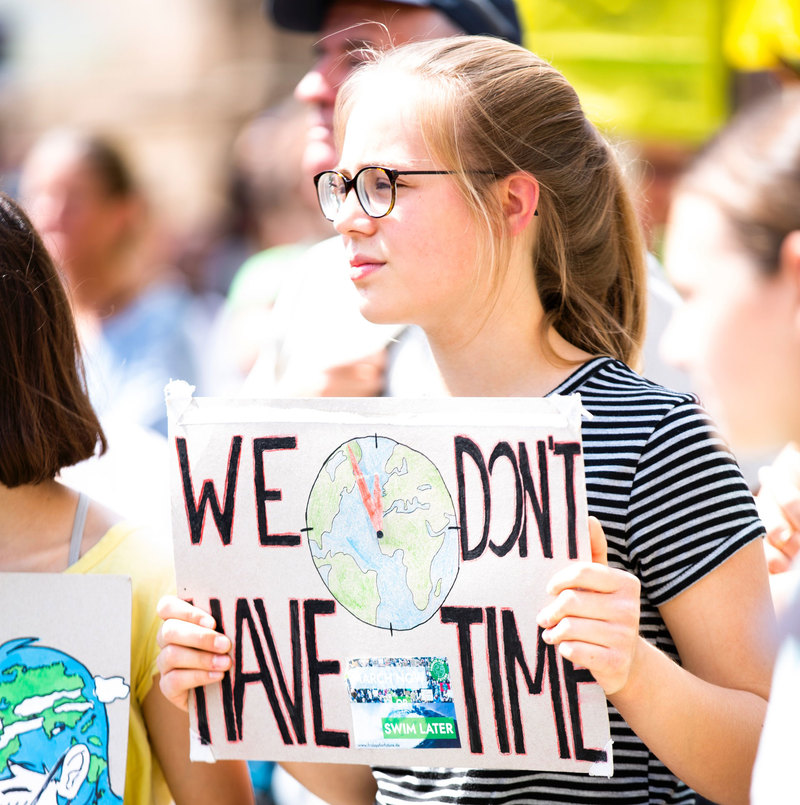Earth Day, our youth and the essential link to climate change
22 April 2020 | Story Dr Jiska de Groot and Dr Debbie Sparks. Photo Pexels. Read time 6 min.
If climate change and global warming are not part of the school curriculum, it means that we are likely to have raised another generation of people with a limited understanding of climate change, write Jiska de Groot and Debbie Sparks from the University of Cape Town (UCT).
April 22, 2020 will mark 50 years of Earth Day, a special day bringing together generations of young and old across the world to raise awareness about our Earth and to promote harmony between our home, Earth, and nature by drawing attention to the negative impact we have on our environment.
The theme for Earth Day 2020 is climate action, because climate change represents the biggest challenge to the future of humanity and the life-support systems that make our world habitable.
The enormity of the challenge - but also the vast opportunities - of climate action have set the issue apart as the most pressing topic for the 50th anniversary.
Earth day provides a unique opportunity for engagement with climate change in South Africa.
Although South Africa has a strong low-carbon activism space, the engagement of the general public with climate change has, until recently, been limited.
Not long ago, the voices of South Africa’s youth remained unheard in the climate response. In the Global North, global warming and climate change are concepts that young people engage with regularly, yet in countries like South Africa this is a more recent phenomenon, that has been partly set in motion by the "Greta Thunberg effect".
This young Swedish woman has become the figurehead of youth-driven climate action in the Northern Hemisphere.
Her tireless fight for climate action together with young leaders around the world has jolted governments across the globe into motion and inspired a generation of young people to demand climate action to protect their future.
Even though this has increased the visibility of young climate activists in South Africa, many of our youth lack a clear understanding of climate change.
To keep the momentum of demanding climate change action, we must increase climate change awareness in South Africa, especially given that it remains the highest carbon emitter in Africa.
We conducted a study which surveyed grade seven children at three schools in Cape Town (representing low-income, middle-income and high-income areas) who had completed the Intermediate Phase of the South African Curriculum Assessment Policy Statements (CAPS) education system, where content subjects like geography and natural science will have been taught.
It is in these subjects that climate change and global warming would emerge as topics for discussion.
We found that many South African youth, as represented by these 12- and 13-year-olds, especially those educated in low-income schools, have little knowledge of global warming and climate change.
Importantly, we found that many young people have had limited exposure to climate change education, since climate change is not explicitly part of the school curriculum.
The significantly less knowledge that youth in low-income schools showed may be because climate change is not a day-to-day priority that parents or teachers discuss with young people.
It is also possible that this is because they themselves have a lack of knowledge or understanding.
A second reason is that youth in low-income communities have fewer opportunities to learn about climate change, since much of the climate change knowledge is online.
We also found that the places where communities learn about climate change were very different across the income groups that we studied, with teachers in low-income areas playing an especially important role in educating youth about climate change.
If climate change and global warming are not part of the school curriculum, it means that we are likely to have raised another generation of people with a limited understanding of climate change.
This is especially problematic as it is the youth that are in school now that will be substantially impacted by climate change by the time they are adults.
To avoid this, we call for action to rectify the inequality in access to climate change knowledge between low-income and affluent households, starting with the mandatory integration of climate change in the schooling curriculum.
We suggest that the curriculum rely less on parent and teacher driven initiatives and more on a structured curriculum that promotes an understanding and awareness of climate change and global warming.
This will help equip our young people for a future in which they live with the realities of climate change.
In addition to education through school curricula, days like Earth Day are an excellent occasion for youth to learn and reflect more about our Earth and the importance of living in harmony with nature, realising our interdependence with other species and therefore the need for us to mitigate climate change.
It is one opportunity we need to grasp and embrace to educate our South African youth about climate change and to prepare them for the future ahead.
After all, we owe it to them.
Dr Jiska de Groot, African Climate and Development Initiative, UCT and Dr Debbie Sparks, Energy Research Centre, UCT.










